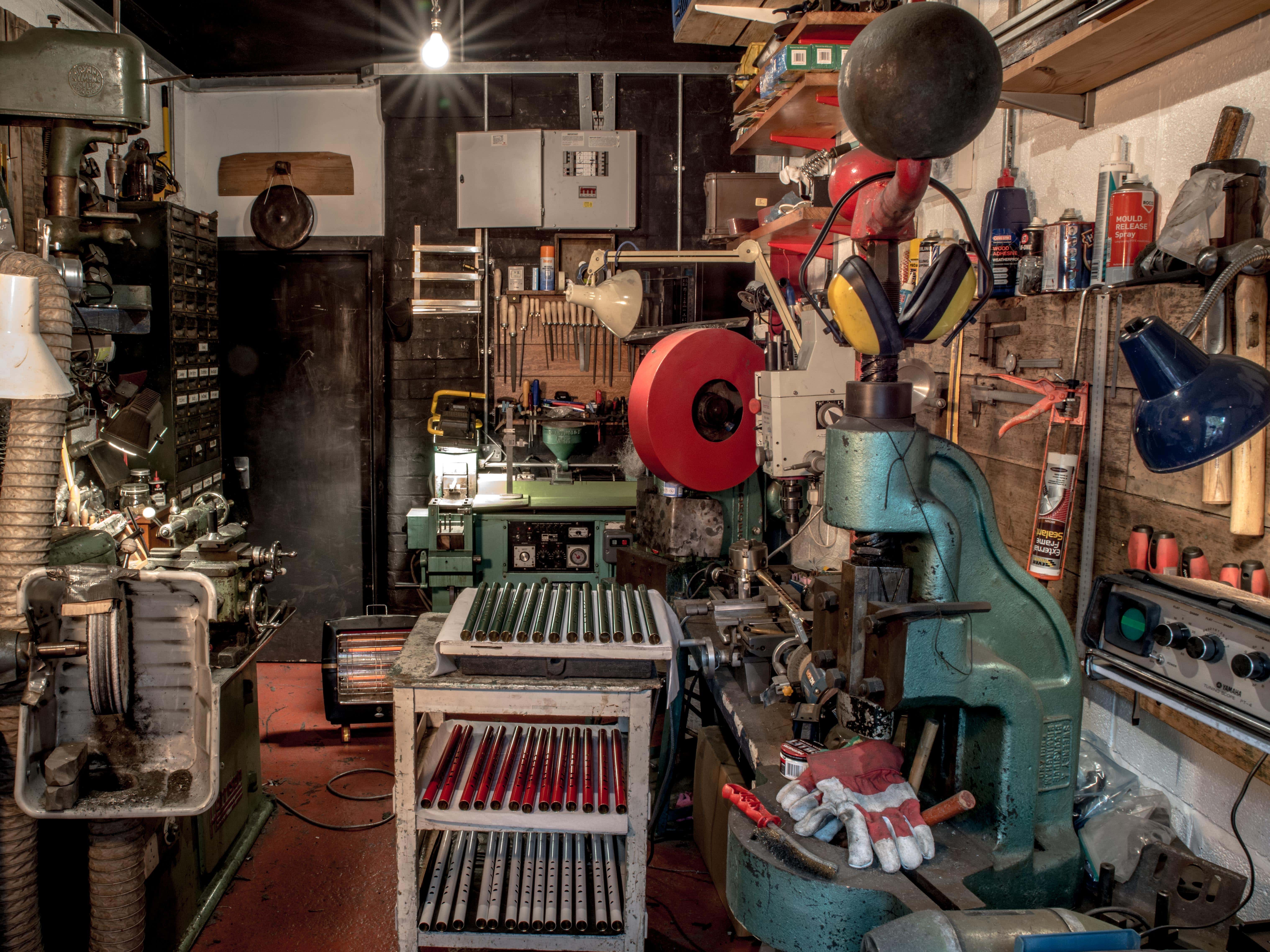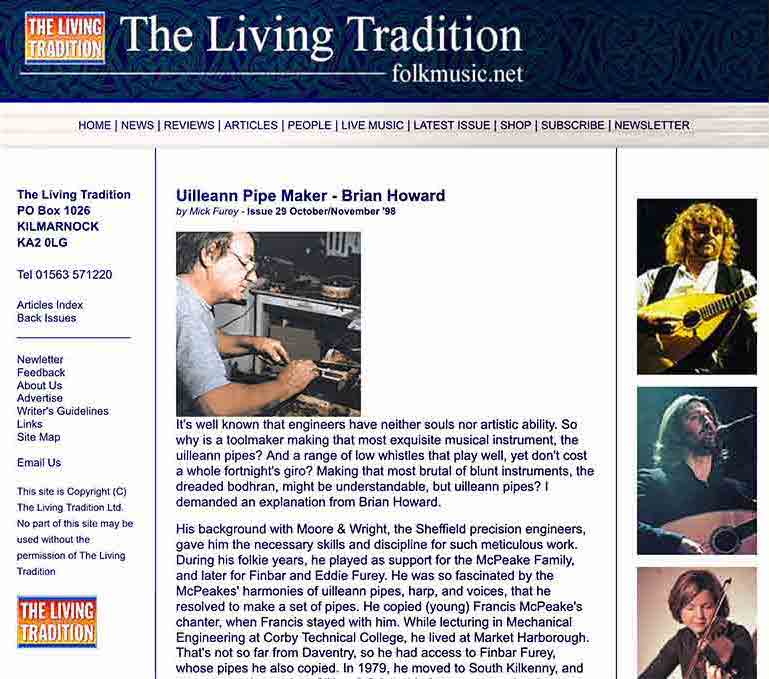Irish whistle makers: our story
How 40 years of craftsmanship from Kilkenny, Ireland, to Sheffield, England, made Howard low whistles renowned across the globe.
Irish whistle makers: our story
Spending his early career at Sheffield precision engineers Moore & Wright, his technical ability as a craftsman – paired with musical talent and immersion in folk culture – led him to develop his first low whistle in 1974.
Brian worked closely with acclaimed folk artists such as Finbar and Eddie Furey, and the McPeake Family as he developed the whistle. After working for some years as a pipemaker in South Kilkenny, Ireland, Brian eventually returned to Sheffield.
In Sheffield, a city that’s home to many craftspeople, Brian became established as a “Little Mester” – a master craftsman who operates on a small scale, consulting personally.
The continuous production since 1974, Howard Music’s low D whistle was the first alternative to The Overton Flute, developed in 1971. Brian eventually went on to develop his own version of the “uilleann-pipe-chanter-reeds” Uilleann pipes and chanter reeds, which he continues to produce himself by hand.
Brian Howard and David O'Hagan
The Tradition ContinuesDavid O'Hagan at Steelworks Studio in Sheffield.
“To me, Musical instruments perform a kind of magic. Between the resonance of an instrument and the oscillations in the air – a door to another world is opened, where the tone element lives. The finer the instrument the more this tone element can manifest. The best instruments are more than the sum of their parts, when they are played, the door is opened, the sound appears to come from around the instrument, filling the space with ease."
Hand-beaten gongs and cymbals made by David O'HaganBrian moved to Sheffield in the early 1970s where he became a friend of the O’Hagan family, their ties strengthened by a shared appreciation of the rich Celtic folk music heritage.
As David’s interest in engineering and instrument making grew it was natural that he would undertake an apprenticeship with Brian and subsequently take over the business.
Brian is delighted that he has been able to pass on the fruits of his many years of experience, expertise and research to someone who shares his passion for quality and precision in instrument making.
“I’m really concerned that some instruments on the market are not of merchantable quality. You find players who are unsure whether it’s the instrument or themselves that’s at fault. All too often, it’s the instrument."
Brian Howard, Master CraftsmanIn 1998 Brian was interviewed by Mick Furey for
The Living Tradition.
Excepts from the interview are reproduced below.
“A big advantage of living in Sheffield is that the city still has a lot of specialist craftsmen; a relic of the cutlery trade where operations were carried out by many workshops. The local term, “Little Mester”, has connotations of the master craftsman who operated on a small scale, perhaps with only an apprentice. So I’m able to consult on a personal basis, and exchange ideas in a two-way flow of information, rather than deal with some impersonal voice in a large company. Within a mile or so of my workshop there are scores of small businesses, with many different skills on offer”.
“… when I first made a brass low D whistle in 1974, I wasn’t too pleased with it. Looking back, my understanding of what was happening wasn’t great. When I came back from Ireland in ’84, the first thing was to design the current low whistles which are still selling well. I didn’t like the idea of a one-piece whistle with a metal head, so I worked out an improved design for the mouthpiece, windway, and fipple, to be made by plastic injection moulding. This took out the variables of a two-piece head, had good volume-control, a better response to temperature difference, and allowed production at an affordable price. Since then, the head has been successfully re-designed to improve playing performance. I still like to play one of the originals like yours, just to demonstrate the improvement”.
“I’m really concerned that some instruments on sale at present are not of merchantable quality. So you find players who are unsure whether it’s the instrument or themselves that’s at fault. All too often, it’s the instrument. Beginners need very good instruments to start with. A good player can get the best out of a poor instrument; a beginner doesn’t usually know the difference. So if beginners pay as much as they can afford, and the instruments are duff, they may become discouraged and blame themselves; usually quite unfairly”.
“Most of my low whistles are of nickel-plated brass. Some have an electro-static powder coating fused on, which makes for ease of handling. Unlacquered brass is popular with experienced players because it’s more resonant. Solid silver is also available; for some reason these are more expensive. I made a gold-plated whistle as a presentation instrument for an old friend. Due to internal corrosion, aluminium is not suitable at all; so I would never use it”.
Brian sees no real conflict between traditional and “progressive” musicians.
“The music is evolving naturally; as it must. It can’t be set rigidly in any one period or style, or it will become sterile and lifeless, and performance will become mere recital. Techniques are developing, as they have done for centuries. If something is good, it will be accepted by the main body of musicians; if it’s not, it’ll just be ignored. The most brilliant tune won’t be widely played if it’s seen as just a technical exercise. The most popular tunes are relatively simple anyway. Music has to mean something to people, or they just won’t bother with it. There was a crisis in the middle of this century, but now interest is so widespread and so enthusiastic that its future health is assured. There are thousands of instruments out there, and most of them are being played for pleasure, by people who have no desire to be on a stage. They play for their own enjoyment and satisfaction, which is the best motive there is”.
Mick Furey writing for THE LIVING TRADITION in November 1998
60 Day Money Back Guarantee
Try it out in the comfort of your own home or at your local folk gathering. Not convinced? We’ll refund you.**
10 Year Warranty
Built to last a lifetime. Your low whistle will be playing music for generations.
Free Shipping Worldwide
We’re all neighbours. Whether you live in Ireland, China, or the USA, we’re pleased to send it out to you for no extra cost.

